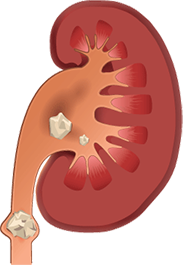
Ureteric Stones are hard mineral and salt deposits that form in the ureter, the tube connecting the kidneys to the bladder. These stones can vary in size and composition, with different types of stones presenting unique characteristics:
Ureteric Stones have been a health concern for centuries, with evidence of their presence found in Egyptian mummies dating back thousands of years. It is interesting to note that certain geographical regions, known as "stone belts," have a higher prevalence of ureteric stones due to factors such as climate, diet, and genetic predisposition. It can affect individuals of all ages, but they are more commonly observed in adults between the ages of 30 and 60. They can range in size from tiny grains to large stones that can obstruct the flow of urine. While some stones may pass through the urinary tract naturally without causing significant symptoms, others can lead to intense pain, urinary tract infections, and potential kidney damage. The pain associated with ureteric stones is often described as one of the most severe types of pain, comparable to that experienced during childbirth.
Ureteric stones can cause a range of symptoms that vary depending on factors such as the size and location of the stone, as well as individual differences in pain tolerance. Here are some common symptoms associated with ureteric stones:
Not all individuals with ureteric stones will experience symptoms. Some stones may remain asymptomatic and go undetected until discovered incidentally during imaging tests or routine check-ups. If you suspect you may have ureteric stones or experience any of the symptoms mentioned, it is advisable to seek medical attention for an accurate diagnosis and appropriate treatment.
Ureteric stones, also known as ureteral stones or kidney stones, are formed due to the accumulation of certain substances in the urinary tract. Understanding the causes of ureteric stones can help in their prevention and management. Here are some common causes:
While these factors can increase the risk of ureteric stones, not everyone with these risk factors will develop stones. It can vary from person to person, and multiple factors often contribute to stone formation. Understanding the underlying causes can help guide treatment strategies and preventive measures to reduce the risk of recurrent stones. If you have a history of ureteric stones or are concerned about your risk, it is advisable to consult with a healthcare professional for a comprehensive evaluation and personalised guidance.
At MASSH Hospital, we provide comprehensive and advanced treatment for ureteric stones, ensuring patients receive the best care possible. Our urology department is equipped with the latest technology and expert specialists to address ureteric stones with precision and minimal discomfort.
Here’s what sets us apart:
* Minimally Invasive Techniques: We utilize advanced procedures such as Ureteroscopy (URS), ensuring that treatment is effective while minimizing recovery time and reducing post-treatment discomfort.
* Expert Urologists: Our team of highly trained and experienced urologists ensures you receive top-tier medical care tailored to your specific condition.
* Advance Technology: We offer cutting-edge diagnostic tools and treatment options to manage ureteric stones with precision and accuracy.
* Personalized Treatment Plans: Every patient receives an individualized approach based on the size, location, and type of the stone to ensure the best outcome.
* Quick Recovery: Our minimally invasive treatments are designed for faster recovery, allowing patients to resume normal activities sooner.
* Patient-Centric Care: We prioritize patient comfort, providing a compassionate and supportive environment throughout the treatment journey.
If you're suffering from ureteric stones, trust MASSH Hospital for expert care and innovative solutions. Reach out today to schedule a consultation and start your journey toward pain-free living.
Embark on a journey of exceptional healthcare guided by industry's true luminaries who consistently exceed
expectations and set new benchmarks for excellence in everything from cutting-edge innovations to personalized care.
MASSH Group of Hospitals is a trusted name in delivering advanced healthcare solutions with a network of premier super speciality hospitals, committed to providing ethical, compassionate, and innovative care. Our expanding network ensures that cutting-edge medical services are always within your reach.